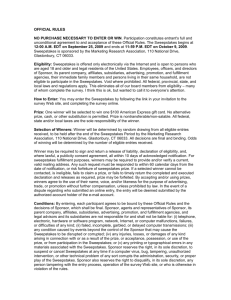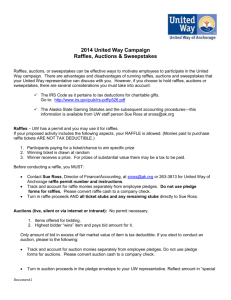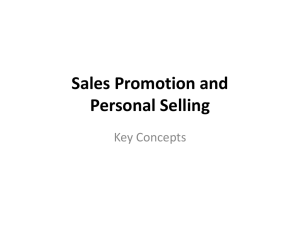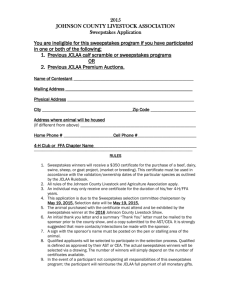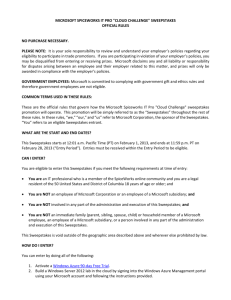BILL ANALYSIS
advertisement
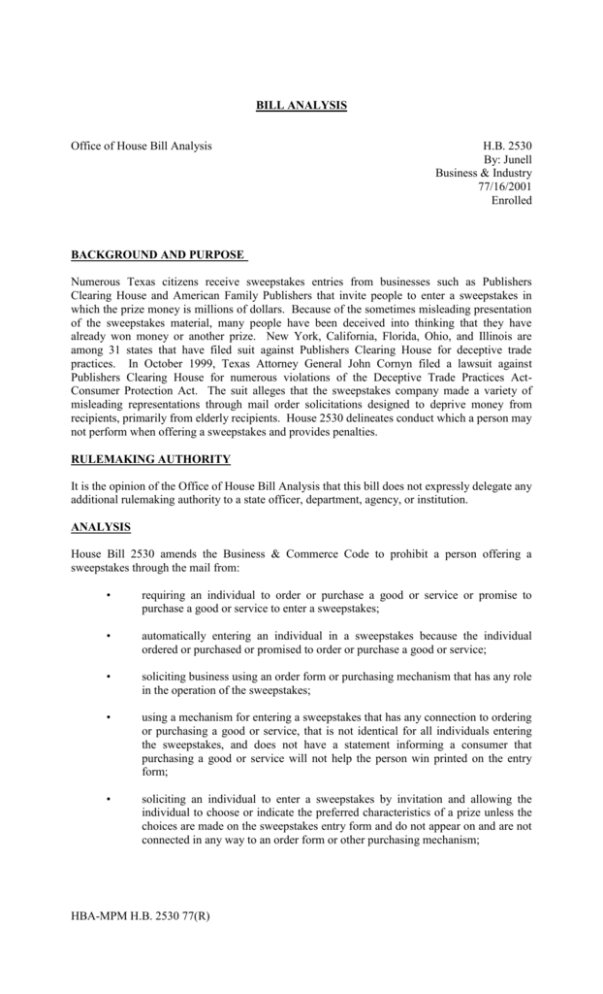
BILL ANALYSIS Office of House Bill Analysis H.B. 2530 By: Junell Business & Industry 77/16/2001 Enrolled BACKGROUND AND PURPOSE Numerous Texas citizens receive sweepstakes entries from businesses such as Publishers Clearing House and American Family Publishers that invite people to enter a sweepstakes in which the prize money is millions of dollars. Because of the sometimes misleading presentation of the sweepstakes material, many people have been deceived into thinking that they have already won money or another prize. New York, California, Florida, Ohio, and Illinois are among 31 states that have filed suit against Publishers Clearing House for deceptive trade practices. In October 1999, Texas Attorney General John Cornyn filed a lawsuit against Publishers Clearing House for numerous violations of the Deceptive Trade Practices ActConsumer Protection Act. The suit alleges that the sweepstakes company made a variety of misleading representations through mail order solicitations designed to deprive money from recipients, primarily from elderly recipients. House 2530 delineates conduct which a person may not perform when offering a sweepstakes and provides penalties. RULEMAKING AUTHORITY It is the opinion of the Office of House Bill Analysis that this bill does not expressly delegate any additional rulemaking authority to a state officer, department, agency, or institution. ANALYSIS House Bill 2530 amends the Business & Commerce Code to prohibit a person offering a sweepstakes through the mail from: • requiring an individual to order or purchase a good or service or promise to purchase a good or service to enter a sweepstakes; • automatically entering an individual in a sweepstakes because the individual ordered or purchased or promised to order or purchase a good or service; • soliciting business using an order form or purchasing mechanism that has any role in the operation of the sweepstakes; • using a mechanism for entering a sweepstakes that has any connection to ordering or purchasing a good or service, that is not identical for all individuals entering the sweepstakes, and does not have a statement informing a consumer that purchasing a good or service will not help the person win printed on the entry form; • soliciting an individual to enter a sweepstakes by invitation and allowing the individual to choose or indicate the preferred characteristics of a prize unless the choices are made on the sweepstakes entry form and do not appear on and are not connected in any way to an order form or other purchasing mechanism; HBA-MPM H.B. 2530 77(R) • offering through the mail any non-sweepstakes prize or other incentive during the 30-day period immediately following the last date on which the person conducted a sweepstakes through the mail; • offering through the mail any opportunity to enter a sweepstakes during the 30day period immediately following the last date on which the person conducted a sweepstakes through the mail; • asking an individual for information or action that would be consistent with the individual winning a sweepstakes prize unless the person has won the prize; • providing an individual who has not yet won a sweepstakes with any document or item that simulates any event, circumstance, or condition connected with winning the sweepstakes; • sending material accompanying or relating to a sweepstakes or an offer to enter a sweepstakes that states or implies that an individual must comply with a restriction or condition to enter unless all individuals are required to comply with the identical restrictions or conditions; • using a scratch-off device or other game piece that suggests an element of chance or luck to convey information about a sweepstakes or an offer to enter a sweepstakes; • sending material accompanying or relating to a sweepstakes that states or implies that: • an individual’s chance of winning a prize is raised, lowered, or different or than the winner of a prize will be selected at a time or place due to a factor that is irrelevant to the way in which a winner is selected; • that the individual has received any special treatment or personal attention from the offeror of the sweepstakes; • that an individual who orders a good or service will receive a benefit or be treated differently in the sweepstakes or that failure to purchase a good or service will cause the individual to suffer a disadvantage; or • that the recipient of the material is a winner or if the recipient is not a winner, the recipient may be a winner, will be a winner under certain conditions, is, may be, or will be among a group from which a winner is selected, or has a better chance than another individual of winning the sweepstakes. • publishing or causing to be published different advertisements for the same sweepstakes that contain inconsistent descriptions of the grand prize; • awarding multiple prizes in a sweepstakes unless all prizes are awarded on the same date through the same selection process; • publishing or causing to be published official rules that do not uniquely identify the prizes to be awarded and the date they will be awarded; or • providing for entry by mail in a sweepstakes by mail and using more than one address to accept entries or using the address for entry in the sweepstakes for any purpose other than entry in the sweepstakes (Sec. 43.002). The bill does not apply to a sweepstakes conducted through advertisements or inserts in magazines, newspapers, catalogues sent through the mail, a charitable raffle, or a sweepstakes regulated by the Alcoholic Beverage Code. The bill does not apply to any company regulated under the Public Utility Regulatory Act or any company that is an air carrier subject to federal 2 law. The bill does not apply to a drawing for the opportunity to participate in a hunting, fishing, or other recreational event conducted by the Parks and Wildlife Department. The bill does not prohibit a sweepstakes sponsor from making a statement in the official sweepstakes rules describing the method used in choosing a winner, from notifying a winner after the winner is selected, or from obtaining an affidavit from the winner to verify that the person is eligible to win the prize and has complied with sweepstakes rules. The bill does not apply to a sweepstakes conducted through the mail if the value of the most valuable prize is less than $50,000. H.B. 2530 authorizes the attorney general to initiate an action by filing suit in the applicable court or county, and requires the court to award a plaintiff a civil penalty of no less than $5,000 or more than $50,000 for each violation found. The bill provides that if the material accompanying or relating to a sweepstakes or offer to enter a sweepstakes contains multiple statements, implications, representations, or offers prohibited by this bill, each is considered a separate violation and shall result in a separate civil penalty. The bill provides that each individual who receives the material constitutes an additional and separate group of violations. The bill provides that any person who provides names or addresses of Texas residents that are used in conducting a sweepstakes that violates the provisions of this bill is liable for the cumulative civil penalties that result from the person’s conduct. If the attorney general prevails, the court is required to award the attorney general reasonable expenses incurred in recovering a civil penalty. The bill requires a civil penalty to be deposited in the state treasury. The court is also authorized to award injunctive relief or other equitable or ancillary relief that is reasonably necessary to prevent future violations specified in this bill. The bill does not create any private right of action for any person. EFFECTIVE DATE November 1, 2001. 3
